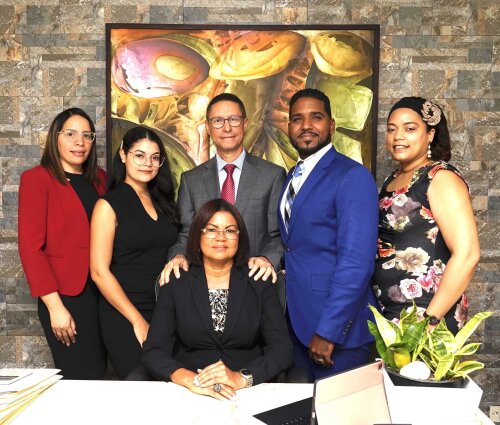Best Child Custody Lawyers in Sosua, Cabarete
Share your needs with us, get contacted by law firms.
Free. Takes 2 min.
Free Guide to Hiring a Family Lawyer
List of the best lawyers in Sosua, Cabarete, Dominican Republic
About Child Custody Law in Sosua, Cabarete, Dominican Republic
Child custody is a crucial legal matter that affects both parents and children when relationships end or family structures change. In Sosua and Cabarete, as in the rest of the Dominican Republic, the law prioritizes the best interests of the child. Whether the parents are married, separated, or never married, issues around where the child lives, who makes decisions, and visitation rights can arise. Understanding local procedures and legal frameworks is vital to ensure the best possible outcome for everyone involved.
Why You May Need a Lawyer
Navigating child custody cases can be complex, especially if you are unfamiliar with local customs and legal requirements in Sosua or Cabarete. Here are some common situations where legal advice may be essential:
- You are going through a divorce or separation and need to define custody and visitation arrangements.
- There is a dispute about which parent should have primary custody of the child.
- One parent wishes to relocate with the child, possibly overseas, affecting the other parent's visitation rights.
- There are concerns about a child's welfare in their current living situation.
- You believe the established custody agreement should be changed due to new circumstances.
- You need to establish paternity to claim custody or visitation rights as a father.
- You are a foreign national and need advice about local legal processes or international custody issues.
Local Laws Overview
Child custody in the Dominican Republic is predominantly guided by the Civil Code and the Code for Children and Adolescents (Ley No. 136-03). The central principles followed in Sosua and Cabarete include:
- The best interest of the child is always the primary consideration in any custody case.
- Civil courts have authority over custody disputes, although specialized family courts may be involved.
- Custody can be granted as sole custody (one parent) or shared/joint custody (both parents), depending on circumstances.
- Mothers often receive preference for young children, but this is not automatic, and each case is evaluated individually.
- Non-custodial parents are generally granted visitation rights unless it is proven detrimental to the child.
- Both parents, regardless of legal custody, retain responsibility for financially supporting the child.
- The law considers factors such as the child's age, emotional ties, stability, and the physical and mental health of parents.
- International cases, including one parent wishing to remove the child from the country, may involve additional legal steps and, in some circumstances, international treaties.
Frequently Asked Questions
What are the main types of custody recognized in Sosua and Cabarete?
The main types are physical custody (with whom the child lives) and legal custody (who has decision-making authority). These can be sole or joint, depending on what is in the child’s best interest.
Is joint custody common in the Dominican Republic?
Joint custody is possible and increasingly common, especially if both parents are considered fit and their relationship is cooperative enough to support shared decision-making and responsibilities.
What does the court consider when deciding custody?
The court evaluates the best interests of the child, looking at emotional bonds, stability, health of the parents, and sometimes the child's wishes, depending on age and maturity.
Can a parent move to another city or country with the child?
Parental relocation, especially abroad, typically requires court approval, particularly if the other parent objects. The court will determine if the move serves the child's best interest.
Are non-national parents at a disadvantage in custody matters?
Dominican law does not grant preference based on nationality. However, non-national parents may face additional administrative procedures, especially regarding visitation if leaving the country.
How is child support determined in custody cases?
Child support is based on the needs of the child and the financial abilities of the parents. Both parents are obliged to contribute, regardless of custody arrangements.
What if the other parent is not respecting the custody agreement?
Failure to comply with a custody or visitation order can result in legal consequences. The aggrieved parent may petition the family court to enforce the agreement.
Can custody be changed after an agreement or judgment?
Yes, either parent can request a modification if there are significant changes in circumstances affecting the child’s welfare.
Does the child have a say in which parent they live with?
Courts may take into account the child’s preference depending on age and maturity, but the final decision will always prioritize the child's best interest.
Do unmarried fathers have custody rights?
Unmarried fathers must establish paternity legally before seeking custody or visitation rights. Once recognized, they have the same rights and responsibilities as married fathers.
Additional Resources
For those seeking legal assistance or information about child custody in Sosua and Cabarete, these organizations and institutions may be helpful:
- District Attorney's Office (Ministerio Público) - Family and Child Protection Units
- Local Family Courts (Tribunales de Familia) in Puerto Plata Province
- Junta Central Electoral for civil registry matters, including birth certificates and parental recognition
- National Council for Children and Adolescents (CONANI) for child advocacy and protection
- Local legal aid clinics and non-governmental organizations focusing on family rights and child welfare
Next Steps
If you are facing a child custody issue in Sosua or Cabarete, consider the following steps:
- Gather all relevant documents, such as birth certificates, proof of residence, existing agreements, and correspondence.
- Document any significant events or changes affecting your child's welfare.
- Schedule a consultation with a local attorney specializing in family and child custody law.
- If there is already a court proceeding, closely follow all legal instructions, attend hearings, and communicate clearly with your lawyer.
- Reach out to family law resources for support and additional information if needed.
Every child custody situation is different. Acting promptly and seeking professional legal advice can protect your rights and the best interests of your child.
Lawzana helps you find the best lawyers and law firms in Sosua, Cabarete through a curated and pre-screened list of qualified legal professionals. Our platform offers rankings and detailed profiles of attorneys and law firms, allowing you to compare based on practice areas, including Child Custody, experience, and client feedback.
Each profile includes a description of the firm's areas of practice, client reviews, team members and partners, year of establishment, spoken languages, office locations, contact information, social media presence, and any published articles or resources. Most firms on our platform speak English and are experienced in both local and international legal matters.
Get a quote from top-rated law firms in Sosua, Cabarete, Dominican Republic — quickly, securely, and without unnecessary hassle.
Disclaimer:
The information provided on this page is for general informational purposes only and does not constitute legal advice. While we strive to ensure the accuracy and relevance of the content, legal information may change over time, and interpretations of the law can vary. You should always consult with a qualified legal professional for advice specific to your situation.
We disclaim all liability for actions taken or not taken based on the content of this page. If you believe any information is incorrect or outdated, please contact us, and we will review and update it where appropriate.










